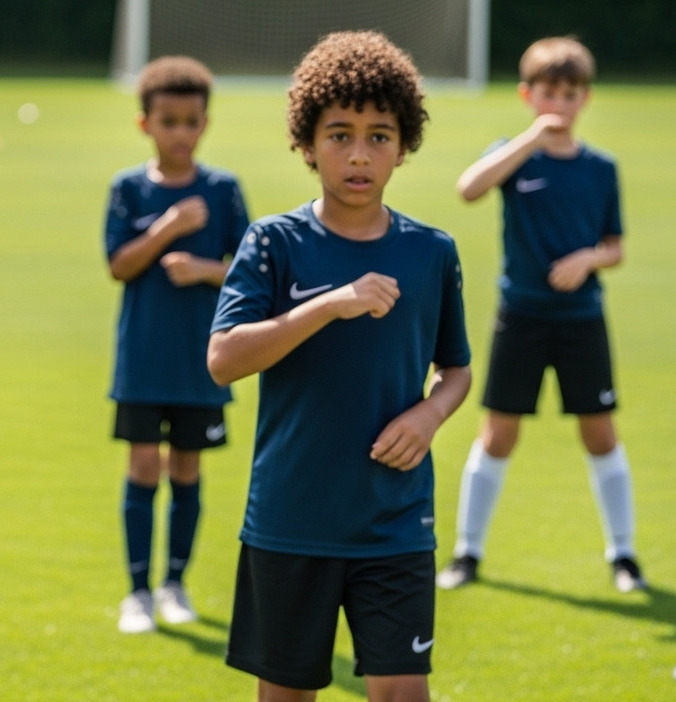At We Make Footballers, we have helped make the dreams of over 200 kids come true, by guiding them to a professional career in football.
We know what to look for and what it takes for that journey to happen in the right way. That’s why we’re here to share all our knowledge with you, the parents of potential future superstars.
In a recent episode for our podcast, Project Footballer, professional academy scouts and coaches Sean Conlon (Chelsea FC), Marcelo Graca (Tottenham Hotspur FC), Iuri Baptista (Fulham FC) and ex-pro footballer / coach Esmond James discussed how to get kids involved, and become better at football.
We’re here to break down in simple terms, a number of ways that you can get your kids involved in the beautiful game. Then, how to improve their skills so that they might have a chance at a professional career.
Of course, we understand that not all children will be aiming for a career in football. And they simply love the game for the joy it gives them. These tips are here to help young players with any level of ambition, big or small.
Start their football journey early
Most academies at professional clubs are looking to sign children at the age group of under 9. This is the earliest opportunity available to give them the greatest chance of breaking into the professional game.
If this is something you’re hoping your youngster will want to pursue, you’re going to need to get them started on their football journey as early as possible. That means two, three or four years old as a minimum starting point.
Even if they haven’t taken to the game as early as two or three years old, there are still some things you can do to prepare them for coaching sessions or summer camps, ready for when their interest potentially ramps up at around four years of age.
Fulham FC academy scout Iuri stresses the impact that prior social interaction can have on a child’s first sessions, “at four or four-and-a-half, if they've not been to nursery or they're not used to other kids, they get overwhelmed with a coaching session with 10 or 15 or 20 kids there. There are sometimes three-and-a-half year olds that come, that have been to nursery and are confident and happy to have the football.”
Spurs academy scout Marcelo also mentions the importance of starting young, “it’s not to say they can’t make it as a footballer if they start at nine years old, but they’ll have a lot of catching up to do. Maybe 10 or 20 years ago it was easier, but now with all the contact time and knowledge that they’ll miss, you may be struggling.”
Ex-pro footballer and children’s coach Esmond James adds his view too, “it’s unlikely that a child at nine makes it, having not been in an academy already. The training kids are getting now from four upwards, the intensity, how many hours they're putting in, is completely different to what it was back in the day. How much the four and the five-year-olds are training, what they're getting and what that nine-year-old has missed, they’d have to be special to keep up.”
To summarise our experts’ conversation, it’s all about getting your kids out there and enjoying their football as early as possible. Making friends and social skills are also key foundations to begin with too.
Let kids discover their own love for the game

You already love football. That’s a given. But children are a little more fickle with their interests. As we’re sure you’re already aware, they like to hop from one thing to the next. And quickly.
Some kids will be drawn to kicking a ball as soon as it’s rolled towards them, that’s all well and good. But what about the ones who don’t have that burning desire? Well, it’s best not to force it upon them, as that could potentially drive them away.
The best plan of action is to surround them with the game, and let them discover it for themselves. Have it on in the background whilst they play or take them to a park that has a live game happening nearby (and don’t worry if they get bored and want to go home).
Fulham FC’s Iuri talks about the power of live football, “Taking them to live games opens their eyes, they just soak it in. The more you can do it, the better. There’s no distraction, you’re sitting there and you’re watching the game.”

Have footballs lying around the home and take one everywhere with you. Ideally, different types with different colours and patterns on them. You never know when the urge may come that your toddler suddenly wants to volley one into the back of the goal (that you secretly set up) in the corner of the room.
Iuri mentions some popular stealth tactics, “whenever you go to the park, take a football with you. If you're fortunate enough to have a garden, get some lights put in and then have a football out there. Let them play, let them enjoy it. Don't force them to do it.”
He then goes on to talk about success he’s had with his own son using this method, “last summer we took my son to the park, we didn't tell him to play football, we just brought a ball along with us. We started kicking it and then he started kicking it and he wanted to play. You're putting the football in front of them, without telling them to go and play it.”
There’s little doubt that if you’re a football-loving family, your child will want to be part of the gang. Humans innately like to belong in groups and have similar interests to their peers and family.
Try to keep football a positive and enjoyable experience for them at all times. And yes, that means no yelling at the TV when your team is losing.
Keep your kids fit and healthy

Fitness and health can be a hugely undervalued part of accelerated development, especially for those parents who are eyeing up big improvements and a potential career at the top level for their child. Remember, it isn’t all about technical skill and game intelligence.
Discipline within the game has changed massively over the last couple of decades, now top players are focused on having the correct diet, perfect workout regimes and regular recovery sessions. At the elite level, those small margins make the difference.
For kids, being active and having a balanced diet is paramount. And it’ll also help them to perform at their best when they take to the pitch or training field. The more energy they have, the more athletic they’ll appear to potential scouts.
The podcast episode focuses heavily on what ‘athleticism’ means and why it’s important to clubs. Every scout in the room has an opinion on it, but they all agreed it’s unquestionably linked to progression.
Chelsea FC academy scout Sean says, “athleticism is important for the formula [for becoming a professional footballer]. It’s important that the player has an athletic ability, to become a Premier League footballer. But parents can be confused by what athletic ability is.”
He continues with a point about what he looks for immediately in young players, “I know when I go to scout at tournaments, you're scanning very quickly, but you exclude kids that don't move well. You have to be careful to ignore players that don't move well, but if I see a player who can move well enough, now I want to look and see what their technique looks like and how they actually play in the game.”
All our experts agreed, but Marcelo expands further, “we hope we’ve made it clear to parents that it doesn’t have to be just one type, you don’t have to be the quickest player.”
Iuri then rounds off the point by saying, “we’re getting confused with athleticism just being about speed, there are so many different components of fitness that incorporate being an athlete. It could be that they are agile, or they get from 0-100 really quickly but their top speed isn’t much, it could be their stamina so they’re able to continuously sprint.”
Overall, being sharp in body and mind will create a well-rounded child who is able to perform their best on the pitch. Whilst genetics do play a part, building agility, speed, acceleration and strength is possible.
Practice, practice, practice (with variation)

Iuri gives us a powerful quote about training and practice, “because of how early kids get signed and how much development happens between the ages of 4 and 8, you need to get as many contact hours as possible, but it has to be fun and it has to be enjoyable. It can't be just repetitive training like five one-to-one sessions a week. It has to be a good balance of training that is appropriate for that child.”
This means taking your kid to sessions, having a variation of drills for defending, dribbling, shooting, passing, crossing and other technical skills. You should also work on agility and speed training, jumping, reaction and change of direction exercises.
You’ll know that the best footballers in the world are the ones that can manoeuvre out of tight spaces or, they simply find space and time on the ball when nobody else seems to have any. Working on drills with added pressure from an opposing player can increase the test for first touch, dribbling and shooting. It will help little players to play faster and think quicker when they find themselves in sticky situations on a match day.
It’s worth emphasising that practice doesn’t always mean kicking a ball either. The best players on the planet tend to think about the game differently too, and training without a ball is just as important. This is something we refer to as ‘football IQ’ or ‘football intelligence’.
Football IQ is the ability to see things on the pitch quicker, to predict what may happen, understanding and adapting to the players and conditions as the game shifts around you. It can be taught, and it’s best to teach it constantly throughout a child’s journey.
Iuri gives us his expert insight, “some players will take up ideas easier than others, but I think it’s about opening brains to different concepts. Whether you use video analysis, watching and talking or physically stopping sessions and stepping into positions.”
If parents have a strong football knowledge and even a professional background in the sport, it’s fair for them to impart their views. But, they should always remain on the same page as their child’s coach. Sean says, “parents that have good knowledge should use that as an advantage. They can talk through and give that football IQ.”
On the other side of the argument around parents that possibly lack a detailed knowledge of the game or coaching skills, Marcelo argues, “sometimes the best thing to do as a parent, if you don’t have that knowledge or that experience, you should stay quiet and leave it to good coaches. You’ve chosen to take your kid to that team, so just back up what the coach is teaching.”
As a parent, you should try to be self-aware and avoid giving your unfounded opinions, as these can sometimes be biassed by personal experience and reverse the good learning that your child is doing. Back up your coach’s philosophy and teaching methods, it’ll help your child to progress quicker.
Encourage and support
As we mentioned earlier, kids can sometimes feel overwhelmed with something new. They can also have feelings of rejection or failure, which can eventually lead to an overall unwillingness to play.
It’s your job as a parent to keep your child engaged and positive about their experiences around football (the coach will do this too). How do you do this? Well, it’s fairly simple in theory and it’ll take time to train yourself to do it constantly.
Positive reinforcement is the keystone. Even if your child fails at a particular skill, struggles in a game or has an issue with any other challenge that football throws at them, you need to get them to focus on the positives of the experience and encourage the solution.
This will help them to step up and try again. Positive reinforcement works when things go well too. If your child follows the coach’s instructions during a game, makes the right decisions or masters a new skill, give them a thumbs up and make sure they know you’re proud of their achievement! They’ll keep coming back for more.
Iuri sums up this positive style of parenting, “you're the driver, you're the parent. Especially if you haven't had the fortunes that we've had of a good football education, then you have to step away and you have to just be a parent and back up the coach 100%.”
Take them to professional coaching sessions
To become the best, you have to learn from the best. That’s something which has happened since the dawn of professional sports. And football at the elite level is no different.
Fulham FC’s Iuri chats about how things have changed for the better, “10 or 20 years ago, there weren't a lot of things for kids of four and five to go to that were football-specific. You speak to a lot of people, they just played in the park, they played with their mates, then they joined brothers and sisters. Now, you can get classes for babies that are 18 months old, not to play football, but it's getting them in and around that environment.”
Professional coaches have earned licenced badges, been through 100s of hours of training and ran 1000s of hours of sessions. They have an unquestionable depth of knowledge which helps them know what your child needs at every stage of their footballing development.

You should feel like you can go to your child’s coach and ask them questions too, this helps you to double-down on the things they’re teaching and helps to embed the learning at home. All of this merges to deliver a positive trajectory for your child.
Coaching is a worthy investment, even outside of your local grassroots football club. We Make Footballers in particular has amazing connections within the professional game and only employs top quality coaches.
In summary
Our pros have talked about lots of different ways to help your children find their feet in the game, whether that’s for fun, or if they’re looking for a shot at stardom in the professional game. So, to round it all up:
Start them young
Starting at the earliest opportunity will give them the most time to develop their skills and a deeper understanding of the game.
Don’t force it on them
Let your children discover the joy of football for themselves, allow them space to find what they prefer with their own decisions. Do that by making it fun.
Health is super important
Providing your kids with a nutritious diet will give them the foundation they need to improve their football abilities and energy on the pitch.
Practice makes perfect
It’s the oldest adage in the book for a reason. Remember to include technical and informational practice while delivering as much variation as possible.
Always be positive
Everything is a lesson, so when things go wrong, encourage your child and offer them solutions to try next time. Don’t forget to celebrate the good things with them too.
If you’re looking to start your kid’s journey the right way by sending them to professional coaches, We Make Footballers hosts weekly training and holiday camps across the UK.
If you would like a free session at We Make Footballers to see what we’re all about, sign up today at your nearest football academy.








